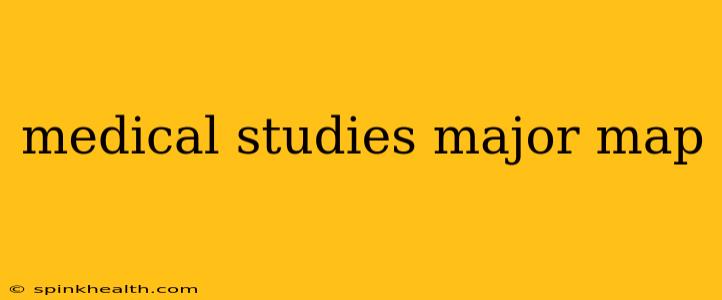Charting Your Course: A Medical Studies Major's Roadmap to Success
The world of medicine is vast and exciting, brimming with opportunities to heal, discover, and innovate. Choosing a medical studies major is the first step on a challenging yet incredibly rewarding journey. But with so many paths available, it can feel overwhelming to navigate the options and plan your future. This guide acts as your personal map, illuminating the key aspects of a medical studies major and helping you chart a course towards your goals.
We'll explore the typical curriculum, delve into career options, and address common questions aspiring medical professionals have. Let's embark on this journey together.
What are the core subjects in a medical studies major?
The foundation of any successful medical career lies in a robust understanding of fundamental scientific principles. Imagine it like building a skyscraper; you need a solid base before you can add the higher floors. A typical medical studies major curriculum includes:
- Biology: This is the cornerstone. You'll delve deep into cellular biology, genetics, anatomy, physiology, and microbiology – understanding the building blocks of life is crucial.
- Chemistry: Organic, inorganic, and biochemistry form the chemical language of the body. You'll learn about the reactions, molecules, and processes that drive life's intricate mechanisms.
- Physics: Understanding the principles of physics is vital, particularly in areas like medical imaging and radiation therapy.
- Mathematics: Statistical analysis and data interpretation are increasingly crucial in medical research and practice.
- Psychology: Understanding the human mind and behavior is essential for effective patient care and communication.
What career paths are open to someone with a medical studies major?
A medical studies major isn't just a stepping stone to medical school; it opens doors to a wide array of rewarding careers. Think of it as a branching tree, with various paths leading to diverse and fulfilling outcomes. Here are just a few:
- Physician (MD or DO): The classic pathway, involving further medical school training, residency, and potentially fellowships.
- Physician Assistant (PA): PAs work alongside physicians, providing medical care under supervision. The educational route is generally shorter than becoming a physician.
- Medical Researcher: For those with a passion for discovery, a medical research career offers the chance to contribute to new treatments and cures.
- Pharmacist: Dispensing medication and providing expert advice on drug interactions and usage.
- Physical Therapist: Helping patients recover from injuries and illnesses through therapeutic exercise and rehabilitation.
- Occupational Therapist: Focusing on helping patients regain their ability to perform daily tasks after injury or illness.
Is a medical studies major hard?
Yes, a medical studies major is undeniably challenging. It demands dedication, perseverance, and a genuine passion for the subject matter. The workload is significant, requiring consistent effort and effective time management skills. However, the rewards – both personal and professional – are immeasurable. It's a journey that will test your limits, but also allow you to grow and develop valuable skills.
What is the difference between a medical studies major and pre-med?
The terms "medical studies major" and "pre-med" are often used interchangeably, but there's a subtle distinction. A medical studies major typically provides a comprehensive education in the biological and medical sciences, offering a broad understanding of the field. "Pre-med," on the other hand, is more of a track or preparation pathway for medical school. It usually involves completing specific courses and meeting the prerequisites required by medical schools. Many pre-med students choose a major in biology, chemistry, or a related field.
What are the admission requirements for medical school?
Gaining admission to medical school is highly competitive. Requirements vary between institutions, but generally include:
- A strong academic record: High GPA in challenging science coursework is crucial.
- MCAT scores: The Medical College Admission Test (MCAT) is a standardized exam assessing scientific knowledge and critical thinking skills.
- Letters of recommendation: Strong recommendations from professors and mentors are essential.
- Extracurricular activities and volunteer experience: Demonstrating commitment to service and leadership is vital.
- Personal statement: This is your opportunity to showcase your personality, motivations, and suitability for a medical career.
This roadmap provides a starting point for your journey into the fascinating world of medical studies. Remember to research different universities and programs, connect with current medical students and professionals, and most importantly, stay passionate and persistent. Your dedication and hard work will pave the way to a successful and impactful career in medicine.

